|
|
|
Sort Order |
|
|
|
Items / Page
|
|
|
|
|
|
|
| Srl | Item |
| 1 |
ID:
183183
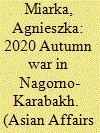

|
|
|
|
|
| Summary/Abstract |
The article aims to analyze the autumn war in the Nagorno-Karabakh region, which took place in 2020, and explain its impact on the strategic balance of power in the South Caucasus region. This issue is important for regional security and power projection in the South Caucasus. The author focused on 1) The characteristics of the course of the war; 2) The impact of the war on the politics of Armenia and Azerbaijan; 3) The impact of the war on the new division of the sphere of influence between Russia and Turkey. In the course of the research, research techniques and methods characteristic of political science and security science (neoclassical realism paradigm) were used, including critical analysis of the literature on the subject, analysis of policy makers' statements, secondary analysis, and interpretation of quantitative data.
|
|
|
|
|
|
|
|
|
|
|
|
|
|
|
|
| 2 |
ID:
155087
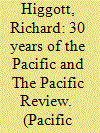

|
|
|
|
|
| Summary/Abstract |
This paper is a review of scholarship found in the pages of The Pacific Review over the last 30 years. It does so in three ways: (1) it highlights issues in the theory and practice of the international relations, strategic studies, political culture and political economy of the Asia Pacific region. (2) It looks at change in the region over time by an analysis of the shifting fortunes of the major regional powers, namely Japan, China and Indonesia and the challenges they, and China in particular, post to US regional hegemony. (3) It looks at regional process reflected in the fate and fortunes of the regional integrative project in the key policy domains of trade, finance and the environment. The paper concludes with a reflection on the strains on the regional political and economic orders by the rise in nationalist politics.
|
|
|
|
|
|
|
|
|
|
|
|
|
|
|
|
| 3 |
ID:
175920
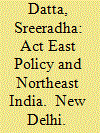

|
|
|
|
|
| Publication |
New Delhi, Vivekananda International Foundation, 2021.
|
| Description |
xxx, 321p.Hbk
|
| Standard Number |
9788194820055
|
|
|
|
|
|
|
|
|
|
|
|
Copies: C:1/I:0,R:0,Q:0
Circulation
| Accession# | Call# | Current Location | Status | Policy | Location |
| 059929 | 337.541059/DAT 059929 | Main | On Shelf | General | |
|
|
|
|
| 4 |
ID:
141291


|
|
|
|
|
| Summary/Abstract |
International Relations (IR) theorists have traditionally viewed rationality and consciousness as defining features of human behavior. But recently this approach has come under fire from several angles. Not only do many psychologists now consider rationality to be dependent on emotions, recent developments in the logics of action debate in IR theory explicitly argue for de-emphasizing the role of consciousness and rationality in theorizing agency. In an effort to put rationality back into its proper place, we critique two recent contributions to the logics of action debate: practice theory and the logic of habit. Both logics of action are useful in many respects, but we argue that they rest on a view of individual agency that is too structural and insufficiently cognitive to fully understand how individuals make decisions in international politics. We do not doubt that unconscious reflexes often control individual decisions, but we maintain that cognitive control and deliberation play a much larger role in constructing these reflexes than practice theory and the logic of habit recognize. We sketch a rational intuitionist logic of action for IR theory. We argue that intuitions constitute the most useful way to theorize the unconscious determinants of individual action and that although intuitions control how people behave in particular circumstances, they are subject to rational recalibration through internal and intersubjective reasoning.
|
|
|
|
|
|
|
|
|
|
|
|
|
|
|
|
| 5 |
ID:
146143
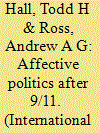

|
|
|
|
|
| Summary/Abstract |
Affect and emotion are key elements of our lived experience as human beings but currently play little role in how we theorize actorhood in international relations. We offer six amendments for integrating affective dynamics into existing conceptions of individual-level actorhood in IR. From these amendments emerge the theoretical micro-foundations upon which we build propositions concerning potential collective-level affective dynamics and political strategies. We illustrate the analytical payoff of our proposals by examining the aftermath of the terrorist attacks on 11 September 2001. By amending existing understandings of actorhood to include human affective experience, we can integrate and make sense of a variety of psychological, social, and political consequences stemming from the attacks, both within the United States and internationally.
|
|
|
|
|
|
|
|
|
|
|
|
|
|
|
|
| 6 |
ID:
144132
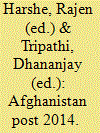

|
|
|
|
|
| Publication |
New Delhi, Routledge, 2016.
|
| Description |
xix, 248p.hbk
|
| Standard Number |
9781138666917
|
|
|
|
|
|
|
|
|
|
|
|
Copies: C:1/I:0,R:0,Q:0
Circulation
| Accession# | Call# | Current Location | Status | Policy | Location |
| 058581 | 958.1/HAR 058581 | Main | On Shelf | General | |
|
|
|
|
| 7 |
ID:
170498
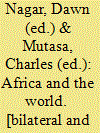

|
|
|
|
|
| Publication |
Switzerland, Palgrave Macmillan, 2018.
|
| Description |
xxxiv, 520p.: figures, tableshbk
|
| Standard Number |
9783319625898
|
|
|
|
|
|
|
|
|
|
|
|
Copies: C:1/I:0,R:0,Q:0
Circulation
| Accession# | Call# | Current Location | Status | Policy | Location |
| 059817 | 327.6/NAG 059817 | Main | On Shelf | General | |
|
|
|
|
| 8 |
ID:
031952
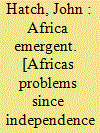

|
|
|
|
|
| Publication |
London, Secker and Warburg, 1974.
|
| Description |
ix, 233p.hbk
|
| Standard Number |
436191261
|
|
|
|
|
|
|
|
|
|
|
|
Copies: C:1/I:0,R:0,Q:0
Circulation
| Accession# | Call# | Current Location | Status | Policy | Location |
| 014981 | 960.326/HAT 014981 | Main | On Shelf | General | |
|
|
|
|
| 9 |
ID:
144614
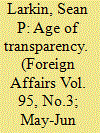

|
|
|
|
|
| Summary/Abstract |
Transparency has long been a rare commodity in international affairs. But today, the forces of technology are ushering in a new age of openness that would have been unthinkable just a few decades ago. Governments, journalists, and nongovernmental organ¬izations (NGOs) can now harness a flood of open-source information, drawn from commercial surveillance satellites, drones, smartphones, and computers, to reveal hidden activities in contested areas—from Ukraine to Syria to the South China Sea
|
|
|
|
|
|
|
|
|
|
|
|
|
|
|
|
| 10 |
ID:
149421
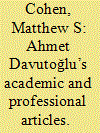

|
|
|
|
|
| Summary/Abstract |
International relations theories have sometimes been criticized as being focused on a narrow set of ideas and values. This article provides a means by which this problem can be addressed by examining the theories of former Turkish Prime Minister Ahmet Davutoğlu, who, prior to joining the government, was an international relations scholar. The article argues that gaining a greater understanding of Davutoğlu’s academic and professional publications is valuable not only to scholars interested in studying Turkey, but also to the study of international relations. Distinguishing him from other thinkers, Davutoğlu’s models are a combination of Islamic values, civilizational theories, and constructivism.
|
|
|
|
|
|
|
|
|
|
|
|
|
|
|
|
| 11 |
ID:
139948
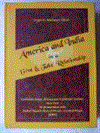

|
|
|
|
|
| Publication |
New York, Center for Asian, African and Caribbean Studies, 2003.
|
| Description |
v, 366p.Hbk
|
| Standard Number |
0972537406
|
|
|
|
|
|
|
|
|
|
|
|
Copies: C:1/I:0,R:0,Q:0
Circulation
| Accession# | Call# | Current Location | Status | Policy | Location |
| 058261 | 327.73054/MOT 058261 | Main | On Shelf | General | |
|
|
|
|
| 12 |
ID:
152314
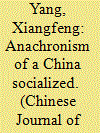

|
|
|
|
|
| Summary/Abstract |
Why has the Western strategy of engagement towards China been less effective than initially heralded? Juxtaposing theoretical advances in the International Relations (IR) scholarship against the evolution of China’s domestic politics and foreign behaviour, this article critically examines the socialization scholarship, not only because of the tremendous amount of theoretical purchase constructivists have invested in it, but also because liberal-minded IR scholars have predictably relied upon this line of inquiry to endorse a strategy of engagement and integration towards an outsider power such as China. I argue that the effects of engagement/socialization are often overstated and oversold, because conventional constructivists, in their attempt to specify the conditions under which certain behavioural adaptation constitutes identity change, tend to obfuscate some issues of theoretical and methodological concern. Two approaches are under the spotlight. First, transnationalism, as it pertains to China, has a poor record of engendering and sustaining domestic political change, because the party-state, firmly in the driver’s seat, fiercely rebuffs any foreign attempt that it deems to undermine its iron-clad hold on state power. Secondly, international institutions are not as transformative as claimed by constructivists, who conflate the distinction between agents and principals. Furthermore, the socialization perspective’s penchant for positioning the state in question in a reactive mode can be an analytical straitjacket, in turn rendering it outdated and inadequate to capture the critically important dynamics and dimensions of a great power such as China in international politics and global governance. I call for a more compressive and eclectic approach that understands China as a proactive participant in international affairs.
|
|
|
|
|
|
|
|
|
|
|
|
|
|
|
|
| 13 |
ID:
175158
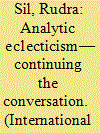

|
|
|
|
|
| Summary/Abstract |
In this response to the contributions in this symposium, I approach the above articles not as wholesale critiques requiring point-by-point rebuttal but as constructive engagements that require clarification or invite further reflection as part of an ongoing conversation. In some instances, I revisit and elaborate upon the main motivations and assumptions that Peter Katzenstein and I had in mind as we sought to lay out the significance of analytic eclecticism for different audiences. At other times, I take it upon myself to consider aspects of our approach that might be updated or reframed in light of concerns raised by some of the authors. I specifically address four issues that have been raised: the core logic of analytic eclecticism and its operationalization with respect to once-dominant paradigms in International Relations; the link between complexity, causality, and constitutive logics; the status of metatheory and the links between eclecticism and pragmatism; and the relationship between scholarly debates and “real-world” issues of policy and ethics. Whether the response is satisfactory or not, it is worth bearing in mind that, for Peter Katzenstein and myself, analytic eclecticism was always meant to be more of an ethos than a method or manifesto; that ethos long predates our published work and is evident in the thoughtful contributions that constitute this symposium.
|
|
|
|
|
|
|
|
|
|
|
|
|
|
|
|
| 14 |
ID:
192455
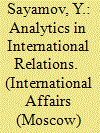

|
|
|
|
|
| Summary/Abstract |
THE concept of "analytics," which has recently become fashionable, has appeared in the Russian active sociopolitical, scientific, and cultural lexicon relatively recently. Analytics is actually a combination of analysis, synthesis, generalization, and prediction, and acts as a link between data evaluation and decision-making.1 It is a creative intellectual activity of extracting new relevant knowledge from the totality of collected information2 and can be considered a special type of such activity aimed at preparing and making decisions.3
|
|
|
|
|
|
|
|
|
|
|
|
|
|
|
|
| 15 |
ID:
188818
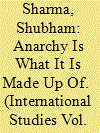

|
|
|
|
|
| Summary/Abstract |
In this article, I attempt to critically assess Kenneth Waltz’s deployment of the idea of anarchy to erect a ‘scientific theory of international politics’. First, I argue that the formation of a concept requires comprehension of the object from the standpoint of historical development, not a narrow reading of it. Second, I subject the thinner abstractions of self-help, balance of power and bandwagoning to the test of history. Third, I argue about mainstream international relations’ disdain for revolutions. I would posit that revolutions are fine templates which store rich agential history of structural transformation, a theme subject to much chagrin by realists of all hues, particularly neorealists. In doing so, I take the Bolshevik Revolution of 1917 as my benchmark. I elucidate that through the occlusion of first and second images, man and state, in the favour of third image, that is, structural anarchy, Waltz tends to ignore the role of agency as a conscious collective which could be best captured by the Bolshevik Revolution. In doing so, I rely on Perry Anderson’s three modes of agency in history. As a corrective to Waltz’s theorization, I make a strong case for class transcending both man and state as an organic category with immense potential of becoming a level of analysis which both acts upon the structure and refracts through it. I finally conclude by saying that anarchy was a condition and not a ‘social relation’ of any sort which could claim to constitute the ‘international’.
|
|
|
|
|
|
|
|
|
|
|
|
|
|
|
|
| 16 |
ID:
049756
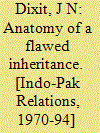

|
|
|
|
|
| Publication |
New Delhi, Konark Publishers, 1995.
|
| Description |
ix, 339p.Hbk
|
| Standard Number |
8122004040
|
|
|
|
|
|
|
|
|
|
|
|
Copies: C:3/I:0,R:0,Q:0
Circulation
| Accession# | Call# | Current Location | Status | Policy | Location |
| 036602 | 327.5405491/DIX 036602 | Main | On Shelf | General | |
| 036603 | 327.5405491/DIX 036603 | Main | On Shelf | General | |
| 058266 | 327.5405491/DIX 058266 | Main | On Shelf | General | |
|
|
|
|
| 17 |
ID:
155770
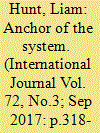

|
|
|
|
|
| Summary/Abstract |
American nuclear diplomacy generally presents a set of explanatory conditions ripe for the political realist: rogue states, an alarmed public, and existential risk create a milieu apt for realpolitik. This case study closely examines the link between the Joint Comprehensive Plan of Action and the theoretical trends in United States foreign policy, specifically with respect to the dictates of neorealism. At the time of writing, the bulk of literature on the Joint Comprehensive Plan of Action and its consequent developments remains lacking in theoretical commentary on how the agreement relates to broader narratives of United States foreign policy. This essay bridges the gap in the literature by drawing a connection between the Iran nuclear deal, neorealism, and liberal institutionalism. The findings suggest that the Joint Comprehensive Plan of Action marks a significant deviation from the predictions of realism, instead acting as an example of liberal institutionalism and potentially signalling a greater shift toward multilateralism in United States foreign policy.
|
|
|
|
|
|
|
|
|
|
|
|
|
|
|
|
| 18 |
ID:
153891
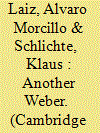

|
|
|
|
|
| Summary/Abstract |
While there has arguably been a partial reception of Weber in international relations (IR), we argue here that his ideas have either been misunderstood or neglected. In order to highlight the most valuable Weberian insights, we focus on two topics of crucial importance to IR. First, in our view, Weber's crucial contribution to the study of states is not his alleged emphasis on the monopoly of violence but his concern with the problem of legitimacy, which is the key to understanding why individuals actually orient an action according to their beliefs in the idea of a state. Second, Weber conducted seminal historical investigations on religion, the rationalization of economic ethics, and organizations that show that the diffusion of isomorphism has little to do with supposedly uninterested and persuasive scientific and professional associations. Instead, more attention should be paid to rational domination and less to reified concepts such as John Meyer's ‘rationalized otherhood’. These arguments are also examined empirically.
|
|
|
|
|
|
|
|
|
|
|
|
|
|
|
|
| 19 |
ID:
170604
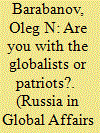

|
|
|
| 20 |
ID:
142685
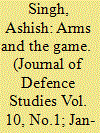

|
|
|
|
|
| Summary/Abstract |
The article approaches the issue of jointness through new lenses. It first describes how and why arms of the military, the ‘Services’, are different from each other. Airpower is shown to be the emerging technological paradigm, triggering paradigm competition. Next, it draws an analogy between anarchy in international relations (IR) and the existence of the services. It then looks at game theory as used in IR to understand both why inter-organisational competition occurs and how cooperation can evolve with a certain kind of behaviour—reciprocity. It also uses the anthropological/biological lens to show how competition and cooperation will always coexist. The article concentrates on the behavioural solution towards cooperation, while commenting briefly on the alternative structural solution, which most writings on the subject focus on. Finally, it lays out some measures possible in the Indian scenario, in tune with cooperation behaviour theory
|
|
|
|
|
|
|
|
|
|
|
|
|
|
|
|
|
|
|
|
|